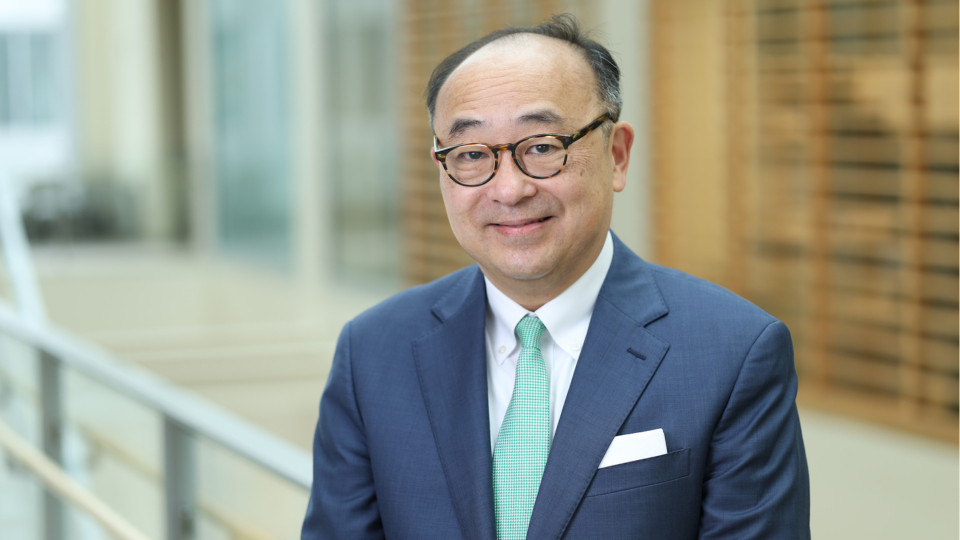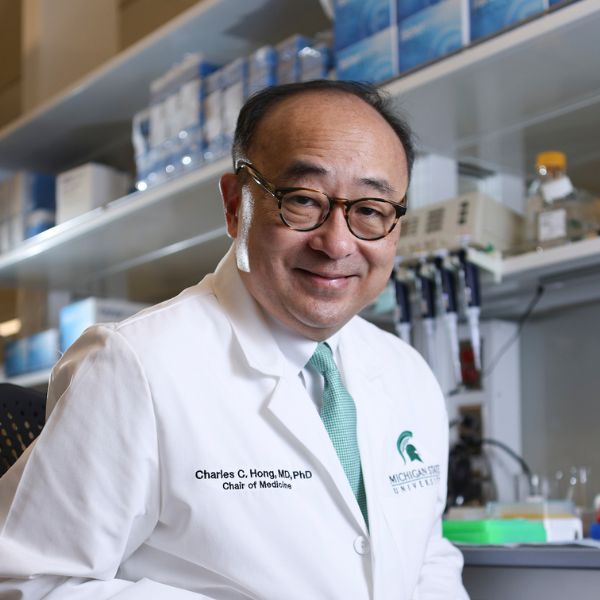Charles Hong Named MSU Research Foundation Professor
February 12, 2025
 Charles (Chaz) Hong, MD, PhD, has been named a Michigan State University Research Foundation Professor in recognition of his decades of scientific research and clinical impact, including groundbreaking research focused on phosphoinositol-3-kinase and mitogen-activated kinase signaling in artery-vein specification.
Charles (Chaz) Hong, MD, PhD, has been named a Michigan State University Research Foundation Professor in recognition of his decades of scientific research and clinical impact, including groundbreaking research focused on phosphoinositol-3-kinase and mitogen-activated kinase signaling in artery-vein specification.
Hong sees that discovery as only one part of the much larger story of how his career helps patients through research.
“We need both hope and science to be a full clinician, to really make a difference,” said Hong, citing this belief as one of his mottos. Years ago, a patient gave him a “Pocketful of Hope,” a little bag full of physical representations of the hope we all need during tough times. It includes items like “a rock to give you strength” and “a star to remind you to keep shining.” To this day, Hong keeps it in his office as a reminder of the way that bringing research from the bench to the bedside gives real people hope.
 Indeed, the hope he has brought to clinical medicine is significant. In addition to the PI3-kinase and MAP kinase signaling discovery, he and his team also invented Dorsomorphin, the first small molecule inhibitor of the BMP signaling pathway that has led to emerging therapies in the fields of oncology, bone disease, anemia, and regenerative medicine.
Indeed, the hope he has brought to clinical medicine is significant. In addition to the PI3-kinase and MAP kinase signaling discovery, he and his team also invented Dorsomorphin, the first small molecule inhibitor of the BMP signaling pathway that has led to emerging therapies in the fields of oncology, bone disease, anemia, and regenerative medicine.
Most recently, he and his colleagues discovered Ogremorphin, or OGM, a drug-like compound that shows a promising ability to kill glioblastoma cells while leaving normal cells unharmed. Glioblastoma is a type of brain cancer that is currently considered incurable, but Hong hopes to have human clinical trials for OGM up and running within five years and to see glioblastoma cured within his lifetime.
The MSU Research Foundation Professor award comes with scholarly funding, which could go toward these goals.
“The MSU Research Foundation professorships are an important tool to assist us in recruiting top talent to Michigan State University,” said Doug Gage, PhD, vice president for research and innovation. “Leaders of Dr. Hong’s caliber are critical as we advance the institution and expand our research impact.”
Hong is the sixth person from the College of Human Medicine to be recognized with a MSU Research Foundation Professorship.
“We’re excited to see how Dr. Hong’s work on glioblastoma treatments develop in the years to come, and appreciate his dedication to bringing new discoveries into the clinical setting,” said David Washburn, chief executive officer of the MSU Research Foundation.
Although his area of clinical expertise is cardiology, Hong has learned to let the research and his trainees lead him down exciting paths when discoveries start to show up unexpectedly.
“I’m mainly driven by curiosity. I just follow whatever’s most interesting, and along the way I’ve made impactful discoveries that have impacted clinical medicine,” said Hong. “Even though I am a scientist, I’m still a doctor. As a physician, I have the obligation to expand our understanding of health and disease, and to educate and give hope to our patients. Our patients–even those who will get sick in the future–are waiting.
Hong only recently returned to his home state of Michigan to assume the role of chair of the Department of Medicine. He has spent time at Harvard, Yale, MIT, and Vanderbilt, so he admits he is hard to impress, but he is adamant that MSU is second to none when it comes to the marriage of research and clinical expertise.
“My science has gotten even better [since arriving at MSU in 2023]. I want to convey that excitement and how wonderful MSU is to our clinical partners and our own faculty. MSU has the momentum, and we need to keep it going.”
When asked what he hopes people understand about him when they learn he is an MSU Research Foundation Professor, he shared, “I want people to get a sense of how much joy I’m getting out of my job… In academics, every year is a new year. There is always a sense of renewal. I wouldn’t do it any other way.”
By: Kayla Crum
Related News![]()
A team of Michigan State University scientists has unveiled a potential game-changer in the fight against glioblastoma, the most common and currently incurable form of brain cancer.


